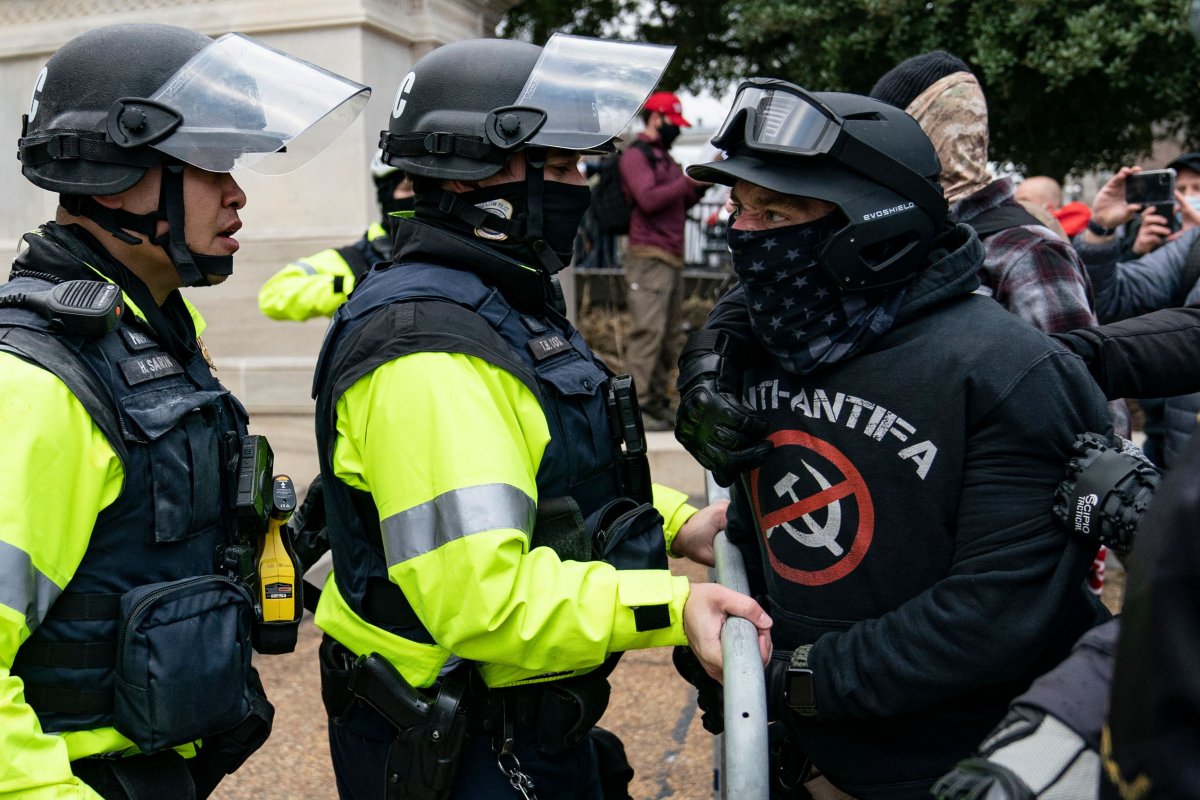A new poll has found that a majority of Republican voters still believe anti-fascist activists were responsible for the storming of the Capitol last week, despite clear statements from GOP leaders and law enforcement dispelling the conspiracy theory.
An Economist/YouGov poll published on Wednesday evening shows more than two-thirds of the Republicans surveyed blame anti-fascist activists—colloquially known as antifa—for the violence, which was actually perpetrated by Donald Trump supporters and conspiracy theorists seeking to overturn the result of November's presidential election.
The surveys were conducted using a nationally representative sample of 1,500 American adults interviewed online between January 10 and 12, just days after a mob breached the Capitol building. The poll's margin of error is around 3.6 percent.
Sixty-nine percent of Republicans surveyed said anti-fascist activists were involved in the Capitol takeover. Only nine percent said they were not, with the remaining 22 percent unsure.
Voters are breaking with party grandees who have tried to douse the flames ahead of Trump's departure. "Some say the riots were caused by antifa," House Minority Leader Rep. Kevin McCarthy said on Wednesday. "There is absolutely no evidence of that, and conservatives should be the first to say so."
Still, some of the president's closest allies including Rep. Matt Gaetz, Rep. Mo Brooks and Rep. Louie Gohmert—as well as media figures such as Fox host Lou Dobbs—have propagated the conspiracy theory. It is at odds with the FBI, which said there was "no indication" of anti-fascist involvement in the Capitol rioting.
The Economist/YouGov poll indicates that even Republicans who do believe right-wing activists were to blame for the riots do not think those involved represent the president.
Seventy-seven percent of Republican respondents said the rioters did not represent most Trump supporters. Forty-two percent of Republicans claimed they were peaceful, with 35 percent saying they were violent.
Democrats have predictably different opinions. Sixty-five percent of those surveyed said those who took over the Capitol did represent most Trump supporters and 84 percent saw the protesters as mostly violent.
Fifteen percent of the Democrats surveyed believed antifa activists were involved in the riot and takeover of the Capitol. Fifty-eight percent said they were not, with 26 percent unsure.
Antifa has become a useful bogeyman for figures on the right, with Trump and others declaring it a terrorist organization and vowing to prosecute those who adhere to its ideology of violent resistance against fascism.
Despite the efforts of Trump and other GOP politicians to claim otherwise, antifa is not a centralized organization. Rather, it is an ideology by which activists use violent methods to stop those they consider fascists. Antifa critics have blamed activists for murders, assaults and property damage, particularly during the summer's racial justice protests.
Antifa advocates have responded to the criticism by pointing out that anti-fascist advocates have been implicated in one murder in the U.S. over the past 25 years, compared with at least 329 people killed by right-wing activists in the same period.
The first killing involving an antifa activist took place in Portland, Oregon, during clashes with far-right groups in August. Michael Reinoehl was accused of shooting dead Aaron Danielson, a supporter of the far-right Patriot Prayer group. Reinoehl was later shot dead by police in Lacey, Washington.

Uncommon Knowledge
Newsweek is committed to challenging conventional wisdom and finding connections in the search for common ground.
Newsweek is committed to challenging conventional wisdom and finding connections in the search for common ground.
About the writer
David Brennan is Newsweek's Diplomatic Correspondent covering world politics and conflicts from London with a focus on NATO, the European ... Read more
To read how Newsweek uses AI as a newsroom tool, Click here.








